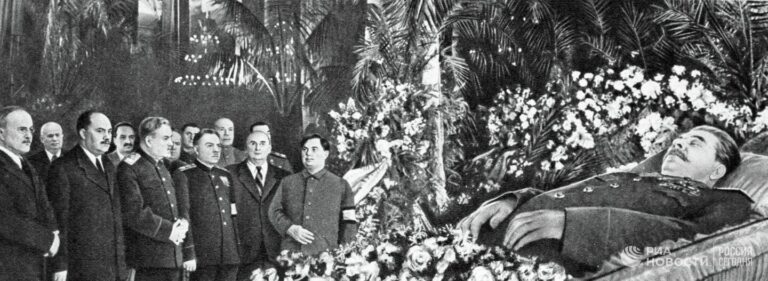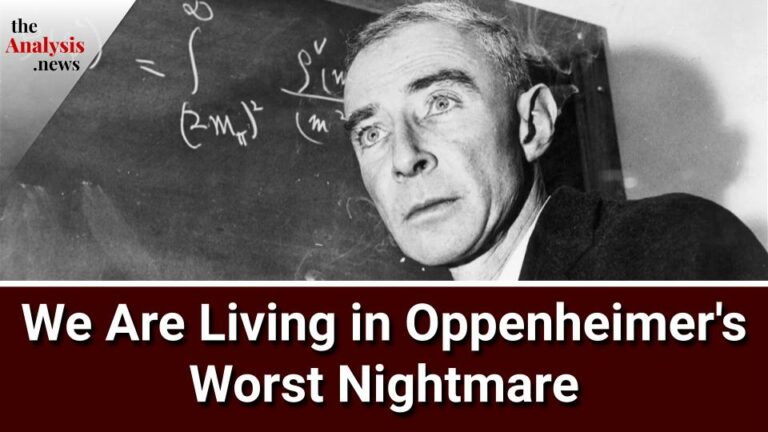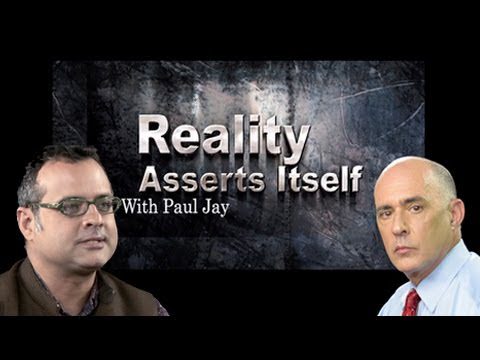This interview was originally published on March 13, 2015. On Reality Asserts Itself, Mr. Franklin discusses the relationship between the mass movement and electoral politics.
PAUL JAY, SENIOR EDITOR, TRNN: Welcome back to Reality Asserts Itself on The Real News Network. I’m Paul Jay. We’re continuing our interview series with Kamau Franklin. Thanks for joining us again. One more time. Kamau’s–works with the American Friends Service Committee, which is a Quaker social justice organization, and was involved with the Malcolm X Grassroots Movement and much more. And his whole bio’s down below the video player here. So we’re going to pick up on another big question facing the movement today, which is the relationship between what’s called movement-building and what’s called having an electoral strategy or participating in elections. And there seems to be a kind of Chinese wall between the two things for a lot of people, which is especially a lot of people who, in the movement-building side–and I guess that means different things for different people, movement-building–think electoral strategy is a distraction, you can’t really accomplish anything, and one way or the other, you wind up being assimilated into the Borg–the Borg being the Democratic Party. What’s your take?
KAMAU FRANKLIN, ATTORNEY AND ACTIVIST: I think they’re mistaken, just to be clear. I think that you have to have an electoral strategy, because those resources matter. They matter to how communities function. When you think about the money that municipalities have, that counties have, that states have, if you just decide to not do anything in that arena, you are sacrificing probably 75 percent of the movement that you could potentially be building to someone else. If you don’t think that changing how people enact policies and how resources are distributed in the community [is important], then I think you’ve made a huge mistake. And I think sometimes people don’t want to get their hands dirty, and I think that sometimes people will say, sort of from the outside looking in, that any sort of attempt to build, particularly locally, and use the Democratic Party as something that you have to build within, there’s some sellout, in that they have this imaginary–in my opinion, imaginary idea that you can just create a third party, and then it’s just going to be able to sort of take control or win people over and come to sort of some sort fruition of winning power. And, unfortunately, I don’t think in America that–I think the two parties are so established, and particularly on a local level, there are openings. And I think in Jackson we proved in some ways that there were openings within a local democratic structure which doesn’t necessarily take its orders from the national party. Local democratic structures in the short term become viable places.
JAY: Democratic Party structure.
FRANKLIN: Democratic Party structures.
JAY: So we’re talking Jackson, Mississippi.
FRANKLIN: Yeah.
JAY: So quickly tell us what happened.
FRANKLIN: Well, in Jackson we had to convince Chokwe at first to run for political office. He was actually opposed to it. He didn’t want to be involved in electoral politics.
JAY: And he was a very prominent lawyer.
FRANKLIN: Very prominent lawyer, advocate. He was well known as a sort of a lawyer who would defend the defenseless. He was well known as an organizer who would take up causes that no one else wanted to take on. Just in terms of spending time in Jackson, you could see how people would come up to Chokwe and whisper in his ear. It’s like, I heard what you said on TV, I really support you, and just would leave and you would not see them again. But I think when Chokwe ran for City Council, our first thought was that we’re going to be building sort of a–.
JAY: And I’m not sure we said it. This is Chokwe Lumumba.
FRANKLIN: Chokwe Lumumba. I’m sorry. That we would be building a sort of apparatus to strengthen what we wanted to do in Jackson, that we didn’t think we would necessarily win. Folks in Jackson, to their credit–I wasn’t there at the time–actually put together a campaign strategy and plan that won that office. And later on, I think Chokwe got the bug to say, hey, I think there are things we can accomplish through this electoral strategy. And he more than anybody wanted to run for mayor. In the first six months of his mayor race, I was his campaign manager. In the last six months, I had left the organization, because we just had differences of opinion around how resources should be spent and how other things should happen. But I think in spite of that that Chokwe Lumumba was going to win. He didn’t need me to win the mayorship of Jackson, Mississippi. I think to our detriment, or to the detriment of the organization, however, the organization wasn’t prepared outside of this individual, important, charismatic person to sort of do other things in Jackson.
JAY: And for those who haven’t followed the story, Chokwe died of a heart attack. How long into being there?
FRANKLIN: Eight months into being here. And, in fact, I think a couple of days ago represented the year anniversary of his death.
JAY: And afterwards his son ran to take–but lost the following election.
FRANKLIN: Yeah, exactly, which I–and I think fits into the issues that was never resolved in terms of what the Jackson plan was supposed to be.
JAY: This is the economic plan.
FRANKLIN: The economic plan and the plan around building outside political apparatuses that could withstand this particular individual or any individual either not being in office–and not, probably, in Chokwe’s case, but in anybody’s case who–if they would get into these political positions, then they may falter around what their policies should be if you don’t have an outside organization that has a base of support that can say, in spite of the pressures that you’re getting, we’re going to push you further left. We were not able, when I was down there, to sort of construct what that outside organization should look like. We did start or people did start doing what was called the people’s assemblies, which were supposed to represent a broader politics for Jackson, Mississippi, and not just the Malcolm X Grassroots Movement. But I think what I found was that the sort of love that people had for Chokwe–and I think this beared itself out through the election campaign of his son–was not just transferable, right? If we didn’t take the time or if people didn’t take the time to build the apparatuses needed on the outside so that they became real places for political power outside of the established order, then, as you saw, those–we would lose the election. And folks did lose the election. So I think what’s happening now, in terms of the work that’s happening, there’s an organization called Cooperative [Cooperation (?)] Jackson, which is trying to do that now. And I think they’re still–folks are still trying to figure out how to build the people’s assemblies.
JAY: So the idea is: how do you create–they used to call it an extraparliamentary movement–that has candidates?
FRANKLIN: Exactly. Yeah. Yeah. Yeah. And at some point also to build–even though I sort of eschewed way sort of third-party ideas, but at some point through this process, to build outside of the Democratic Party, and potentially to build a third party.
JAY: Now, was Jackson done through the primary process of the Democratic Party?
FRANKLIN: Yeah.
JAY: [crosstalk]
FRANKLIN: When we came down to the decision around whether to run Chokwe within the Democratic Party or to run him as a third-party candidate or a third political party candidate, we decided that victory was at hand and that if you–Chokwe Lumumba was an older gentleman who had this chance because, again, of his relationship, his personal relationship to the community. And the MXGM was an extension of that, but it wasn’t necessarily, again, transferable, that the better part was to take this opportunity to win and to build from within.
JAY: So I know you know some of the activists in Ferguson, and there’s a lot of–I think, a lot of discussion/debate about what to do about the electoral politics in Ferguson. You have an all-white city council, and they’re the ones giving marching orders, more or less, to the police department. So if you want to mitigate the police department, one would think you need to do something about city council. But most–if I understand it correctly, most of the activists do not want anything to do with electoral politics.
FRANKLIN: There’s an all-white city council, basically, it’s white mayor, and it’s a white police chief. And some will say, like, putting a black face [incompr.] to replace those white faces may not make a difference.
JAY: Well, we have that in Baltimore. We had a black city council, a black mayor, a majority black city council, a black mayor, and a pretty–not a very–and a black police commissioner, and not the most wonderful police force.
FRANKLIN: But, again, I would disagree with them, right? ‘Cause I think that the pressure that you can put on black people who will make promises to get those places are more than what you can do to the white folks who feel like they’re not beholden to that vote anyway. And it’s a majority–Ferguson is a majority black city, right?
JAY: But isn’t it also–it’s not just about some black faces getting on city council. It’s about an electoral strategy for a movement and getting progressive black faces in city council.
FRANKLIN: Yes, yeah, which I think is a struggle that has to be taken up. And even if folks are sort of so disgusted with what they see as the political apparatus, again, if you leave that open, then you leave so much resources on the table, you leave so much changes that you can happen on the table, and you just give it away to somebody who will do nothing with it. The police chief has not been fired, there has been no change in the mayor, no change in the sort of political structure. As much pressure as folks have put on from the outside, it still has not sort of made these folks sort of shy and go away. And they haven’t built the apparatus necessary to run folks and run proper candidates to take this office. I think it’s part and parcel to any larger struggle.
JAY: Well, the counterargument would point to Wisconsin, where you had this big movement of public sector workers, and with a lot of public support, with mass protests, occupying the state legislature, and so on. Then the recall campaign comes, which becomes an electoral campaign. And lot of the activists at the time were saying, don’t that involved in this recall campaign; in fact, don’t even do one, ’cause it’s going to suck all the energy out of the protest movement building. It became an or–like, you either do the movement or you do the recall. Now, the recall forces won in the sense that most people got mobilized. They lost the recall, and they kind of lost the whole thing. They never got the protest movement back again. And now the unions have been kind of broken–you know, the power of the unions in Wisconsin has been terribly undermined.
FRANKLIN: But I think they were left with little choice. If they didn’t do the recall, it wasn’t as if this governor was going to fade away anyway. He had four years. He had the majority of Republicans in the legislative seats. So that was a fixture. So why not try something different that hadn’t been tried for a very long time in terms of recalling a governor in Wisconsin or any state, right? This is not something that happens every day. You have to try these electoral strategies even if you don’t think they’re going to be–the victory is not going to be there. If you don’t try them, again, you still get the same thing that’s happening. He’s still in place. He’s won another election. But it speaks larger to the other discussion we were having around which way forward for the white working class. Right? So he could not have continually won and had a majority Republican won without some change in the thinking and, I guess, the aspirations of the white working class in Wisconsin.
JAY: Well, and the other thing too is–and I wasn’t in Wisconsin, and maybe it just wasn’t possible, but there needed, I think, to be a big fight with who’s going to lead the recall campaign. If you’re going to turn the recall electoral strategy over to the Democratic Party apparatchiki, then, yeah, you’re going to wind up–even if you win the recall, what exactly are you going to get? And in the course of it, you’re not going to have a movement left. Maybe the conditions weren’t there, but it seems to me that was the next fight is the movement needs to lead this recall campaign and fight over who the candidates are going to be.
FRANKLIN: And I think you’re exactly right. Again, I think that the struggle in Wisconsin and in several other places around what’s going to happen with these right-wing, regressive, Republican-dominated governors and legislative apparatuses, it can’t be left to the Democratic Party, right? You can push the Democratic Party and you can push some folks within the party, but unless you sort of bubble up and figure out new candidates who have progressive credentials who could be held accountable to the people who put them in those places–.
JAY: You’ve got to take over the local apparatus.
FRANKLIN: Yeah. And if you don’t do that, again, if you cede that ground, then I think you’ve left a lot on the table without even trying.
JAY: It probably depends, especially if you’re talking at a city level, what the strategy might be. I mean, maybe in some cities it could be a third party, a Green Party, or something that springs out of the municipal history, but in other places maybe it’s a fight in the Democratic Party primaries. But, still, most of the movement activists that have come up, both in Occupy and out of Ferguson and associated things, they seem to think anything to do with electoral politics is just going to make them prisoners of the Democratic Party, and they won’t have anything to do with it.
FRANKLIN: Yeah. And I think logically when someone traces the history, there is some sense that is made of that, right? But it’s almost like having pure politics without pure action. So, just because you decide to not operate in this area, it doesn’t mean it’s not going to exist. And I think that’s unfortunately what’s happened. People have sort of talked themselves out of an area of struggle, ’cause, again, they think that they are intellectually too pure in some ways to get their hands dirty and to struggle in that apparatus or in some apparatus that changes who’s in power as far as–again, millions and, in some cases, billions of dollars are decided in terms of where it goes, who gets it, who gets tax breaks, what gets zoned, what happens with public schools, what happens in terms of charter schools. If we cede all of that ground–and as you can see, in most cities where we’ve actually ceded that ground or we haven’t brought in progressive candidates to make some kind of change or do something, we’ve lost a lot.
JAY: Well, it also, I think, has to do with focusing too much on the police. I mean, I think we should stop calling them police and call them law enforcement officers, which they like being called anyway. But it stresses the fact that they’re there to enforce a set of laws that reinforces fundamentally unjust social, political, economic relationships. They enforce those laws. If you don’t change the laws, you’re not really going to change the cops. Maybe you can mitigate it a bit, you can get them to be not quite so abusive, you can nibble around the edges of the thing, but as long as they are enforcing laws that reinforce injustice, the police are going to be what they are.
FRANKLIN: I agree. But I think the dilemma with that is that the–again, particularly in the black–.
JAY: I’m not saying not to mitigate.
FRANKLIN: Yeah. No, I’m just saying that–.
JAY: Mitigating’s better than nothing.
FRANKLIN: Yeah. But the dilemma for folks who–the person that they most interact with who represents the state are the police. And so it’s hard to leave that alone and think that you’re going to skip over that.
JAY: Oh, I’m not saying skip over it. But if you want to blame the Iraq War, if you’re an Iraqi, you’ve got to fight American soldiers. On the other hand, you know who sent them there. And it’s a little different here, because the people sending them there are here. They’re not halfway around the world.
FRANKLIN: Yeah. And, again, if you give up the electoral strategy, I agree. Then you don’t change larger policies. But I think it becomes–I mean, I think the getting-at-the-police issue can become a larger strategy for other things that ail the community. And I think it’s traditionally sometimes been used as such. And I think–so focusing in on police issues can, if done smartly, lead to bigger and other changes in terms of sort of progressive challenges to what’s happening. So I think one way in which some of that is happening is there are some groups that I’m talking to. You know, we did this event in January, trying to bring several groups across the country together to talk around police violence, and we’re thinking about doing something similar again in May that talks not only about police violence but economic justice. Right? So I think when you bring issues together, larger issues, and try to figure out strategies to let folks know that this leading arm of the state is not the only way in which it interacts with you–and, again, I agree; as you said, if you don’t, again, get involved in electoral politics in some way, you don’t get your hands dirty, you’ve ceded so much ground.
JAY: Yeah. I mean, we’re agreeing with each other, but the issue of civilian management boards of police, with the ability to hire and fire police chiefs, real accountability for cops with state attorneys that actually charge cops with crimes, I mean, all of that is a necessary thing. But I just think that too much into the conversation is limited to just being good cop, bad cop, and we need to talk about the laws that they are enforcing is the fundamental thing that creates these great sections of, for example, Baltimore, where we are, of horrible chronic poverty that goes on for years and years and years and nothing changes.
FRANKLIN: And, again, I think you’re correct. I just think that when your day-to-day existence gets jeopardized because you are stopped in the street and you are potentially arrested and harassed and/or beat up and killed, your first angle into challenging the state will be police violence, as young black folks. And that has to be a battle that’s taken on. But it has to be taken on with some larger objectives attached to it, because if you only want to change a police commissioner, right, then you’re just left with a new face in charge of there. But I think if you take on that battle knowing, as in Ferguson, that there should be additional battles, right, there should be battles that brings resources into the community, there should be battles that says resources which should be going to the community should be redirected towards the community, and that can only happen through some sort of electoral strategy, if you leave that alone, then those folks who always have that power over you–and we will still be coming back one year later, two years later, three years later, because there will still be these atrocities that happen where somebody’s taken out and killed, and that becomes the public face of the battle.
JAY: Okay. Much more to talk about, which we’ll do in another session. Thanks for joining us.
FRANKLIN: Thank you for having me.
JAY: And thank you for joining us on Reality Asserts Itself on The Real News Network.
Never miss another story
Subscribe to theAnalysis.news – Newsletter
“Kamau Franklin is the founder of Community Movement Builders, Inc. Kamau has been a dedicated community organizer for over thirty years, beginning in New York City and now based in Atlanta. For 18 of those years, Kamau was a leading member of a national grassroots organization dedicated to the ideas of self-determination and the teachings of Malcolm X. He has spearheaded organizing work in various areas including youth organizing and development, police misconduct, and the development of sustainable urban communities. Kamau has coordinated and led community cop-watch programs, liberation/freedom schools for youth, electoral and policy campaigns, large-scale community gardens, organizing collectives and alternatives to incarceration programs. Kamau was an attorney for ten years in New York with his own practice in criminal, civil rights and transactional law.”










